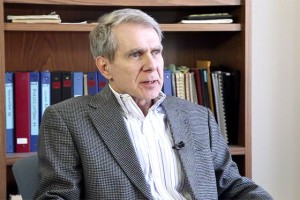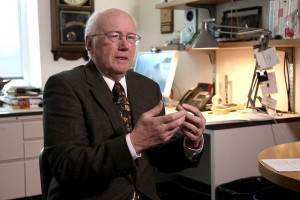Principles of Invention
Microbiologist Kim Lewis on the engineering approach to invention, the perfect solution, and abstracting the p...
The problem of the governance of science has to do with the fact that the science as we normally understand it is an authoritative form of knowledge, and it gains that authority from having been produced by what we regard as the best methods available to produce knowledge. It typically involves extensive training, and not just training in methods, but also in terms of understanding the past of how knowledge has been produced. So at the end of the day, this is a matter that in the first instance is really the property, you might say, of an elite group of people. Of people, who are able to go to university, or able to study and so forth. And so while knowledge may be valid in terms of providing reliable guide to how we should conduct our lives in the world, nonetheless there is an issue of accountability that remains open. And that is to say, who should have a say in terms of how this knowledge called science ought to be taken forward. Now this wouldn’t be so much of a problem, if science wasn’t making claims to be a universal form of knowledge.
So when we think about science, we’re often thinking about things like physics and Newtonian mechanics, Einstein and Darwin maybe, in other words, forms of knowledge that apply to everything at all places at all times, regardless of who you are. So there is a sense in which knowledge is seen as the ultimate authority beyond any political authority, maybe even beyond even theological authority. And so the question becomes, to whom this knowledge called science should be accountable? And in the first instance, science is accountable to the people producing it. And this is what we call the peer-review process. Peer-review is an idea that has to do with the fact that knowledge may come from many different places, people may be doing different kinds of investigations, inquiries, etc., but there is got to be a point at which all of those people are going to have to go to some place and make those claims public, make a public argument, explain those claims and persuade people, who have not actually had direct contact with the original material.
And this is what peer-review is all about, and academics are very familiar with this process whereby you’ve done some research, you’ve spent a lot of time by yourself or whatever, and then you suddenly write it up and you send it somewhere to a journal. And then there is a question about how do the people who read this accept what you’ve written as valid knowledge. Peer-review process involves a large degree of trust, because in a sense, the people reading your stuff and the people who have to decide whether what you’re saying is true will not have had first-had experience of what you’re talking about. They have to trust you. This is an issue. Now, because in science there is methodology, which whereby you have to lay very clearly on paper, what it is that you’ve actually done before you’ve got to the point where you’re producing knowledge, this provides a check, a promissory note with regard to trust.
In other words, a validation beyond just either the people who produce the knowledge first-hand, and even beyond the people who agree that the knowledge is valid. So there is this additional level at which science is valid, and the question becomes – how does that get established, how does the peer-review process translate into some sense of scientific validation that is greater than just what the scientific community claims for itself? This is the real problem of the governance of science as far as I’m concerned. And so you might say that there are two different ways of dealing with this matter. And I’ve been writing about this for a long time, I have a book on the governance of science, which came out nearly 20 years ago. But I think there are two general ways. One way is to say that we treat the production of knowledge through science as an external thing. In other words, that scientists do their thing, they do it individually, and then through the journal peer-review process they agree on something, and then everybody else agrees to that, once the scientists themselves have agreed.
So you have a chain of command, where you start with the individual scientists doing the first-hand research, then it gets to the journals that provides another validation, and then the general public just agrees to whatever the scientific community in this collective sets has agreed upon. And I think a lot of scientists like this idea. And I think it’s also very convenient from the standpoint of policymakers in a certain way, because what it does is – it creates a very clear divide between what the scientist does, so the scientists had agreed to this, so it must be true, and so the policymakers in the way have an excuse in case they start to use this knowledge of these scientists and it goes wrong. So the idea here is if the public or the policymakers actually accept the scientific knowledge that has already been agreed upon by the scientific community, then if it turns out that this knowledge doesn’t do what people expect it to do, then you can say: ’Well, the science was bad, scientists agreed on it, but they were wrong’.
And the policymakers are OK, because the policymakers trusted the scientists. And as long as there is this bond of trust between policymakers and the scientists that is based on a very clear sense of governance, namely the scientists govern themselves, but then once the scientists say something, the policymakers can do what they want with that. If there is this clear divide, if the things go wrong, the scientists may be have done something wrong. It’s easy to give that excuse, because scientists themselves are not actually involved in policymaking, they draw line. And as soon as scientists draw a line and just say: ‘OK, we’ve figured out what’s true, and now it’s up to policymakers to do what they want’, they have in a way absented themselves, they’ve made themselves absent from any other political discussion. And so there is a different sense of governance of science that I’m talking about. And that’s one in which the scientific process itself brings in more and more of the public into its’ production, in other words, it becomes harder and harder to distinguish the public from the scientists.
Now, there are lots of ways to do this. One way, which is in fact what happened historically is that science itself has increasingly brought in people from backgrounds: economically disadvantaged people, women, minorities, all of these kinds of people, who previously have not been involved in scientific knowledge, they are now part of it. They are now part of it in its first-order way and in its second-order way. And what that means is that there is a sense in which the scientific community is becoming more and more representative of the larger society that science would feed into. And then it starts to reduce the distinction between science and the larger society. So it becomes harder then for policymakers to say: ‘Well, this is just what scientists think, and they got it wrong, and we’re doing something else’, but rather if more and more of society is actually involved in the production of scientific knowledge, then it becomes harder and harder for politicians and policymakers to draw a line between science and the rest of society.
So from my standpoint, the way in which we should be promoting the governance of science in the future is actually to get more and more people involved in the production of science itself. And I think, once we do that, and we have a democratized science enterprise, where people feel that science isn’t different from them, then I think we will get a properly organized sense of what I believe the governance of science should be.

Microbiologist Kim Lewis on the engineering approach to invention, the perfect solution, and abstracting the p...

Historian and Philosopher of Science Liba Taub on Aristotle, the cattle problem, and art as a means of science...

MIT Senior Research Scientist David Clark on contention in communication industry, alternative to the Internet...